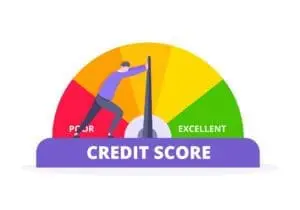
5 Tips to Improve Your Credit Score
Your credit score reflects your trustworthiness and ability to meet your financial responsibilities. A credit score ranges from 300 to 850, and it is based on the information in your credit report. The higher the score, the more creditworthy you are; however a low score makes everything harder.
FICO and Vantage Score are the most widely used credit scoring systems and will range from 300 to 850 points, in which 700 is an acceptable score. A strong credit score has a significant impact since you’ll get lower interest rates on anything from personal loans and student loans to credit cards and mortgages. Your score is heavily influenced by paying your bills, but other variables also play a role. There are some steps you can take to enhance your credit score. However, it requires some effort and, of course, time.

1. Keep Old Accounts Open As Long As Possible
You may be quick to have any evidence of your school loans or vehicle loan deleted from your credit record once you’ve paid them off. On the other hand, those debt records may significantly increase your credit score if you paid on time and in full. It also applies to your credit card accounts.
Closing a credit account will damage your score since your maximum credit limit will reduce. If you still owe money on other credit cards or loans, keeping the card’s balance at zero is ideal. Any bad debts that could hurt your credit score are paid off over time.
Bankruptcies can last up to ten years on your credit report. At the same time, delinquencies and late payments such as foreclosures, settlements, repossessions, and collections can remain on your record for up to seven years, according to Ulzheimer.
2. Pay Your Bills on Time
According to Experian, payment history is the most crucial element for your FICO and VantageScore. A reputation for on-time payments is a strong indicator that you’ll manage future loans responsibly to a lender. Missing deadlines regularly will lower your score. Try to make your loan payments and credit cards on time, as the credit bureau receives notifications of late payments of 30 or more days.
To avoid overdrawing your bank account:
- Automate your payments or set a reminder.
- If you have problems paying, contact your credit card provider and explain your situation rather than declining to make payments.
- Keep track of bills that don’t appear on your credit reports, such as gym memberships and subscription services.
Even though they don’t significantly impact your score, the accounts can harm your credit rating.

3. Maintain a Modest Credit Use Rate
Check your balances against your available credit to ensure you’re not overextending yourself and putting yourself at risk. People with the highest average FICO ratings have a 7 percent utilization rate. The date in which your credit card company’s reports to credit agencies affects your speed.
FICO’s scoring systems don’t distinguish between people who pay their bills in full each month and those who have a balance. Your utilization rate on your issuer reports are used to calculate your credit score. However, VantageScore considers whether you carry a balance monthly or pay in full. Try consolidating with a 0% introductory rate transfer credit card if you’re struggling with immense proportions and growing card interest payments. However, make sure you understand when and how much the rate will increase.
4. Utilize Credit Score-Increasing Programs
The average age of accounts you own is crucial in your score, putting those with little credit history at a loss. UltraFICO and ExperianBoost are credit-building programs that allow users to supplement a weak credit profile with additional financial data. After opting in, you can link your online banking records to Experian Boost and enable the credit bureau to add utility payment and telecommunications records to your report.
When UltraFICO calculates your score, you can allow it to examine your financial data, such as checking and savings accounts, alongside your report.
5. Apply for Credit Only When Necessary
When you apply for a new line of credit, your credit report receives a hard inquiry. This sort of question temporarily lowers your score. It’s not a good idea to use it only to check whether you’ve received approval or because you have gotten a pre-qualified offer of credit. However, the decrease will be minor if it’s just a single hard credit pull.
A slew of hard inquiries, on the other hand, could signal to lenders that you’re taking on too much debt. According to a TransUnion representative, the effects of a hard credit pull on your credit score might last up to a year. If you require new credit, research whether it’s a good fit for you. You should avoid applying for numerous credit cards in a short period or taking out a substantial loan such as a mortgage.
When shopping for a vehicle, mortgage, or getting a personal loan, you can keep complex queries to a minimum by quickly comparing rates. Applications for a similar type of credit will only show as a single hard inquiry if submitted within a specific time range. According to FICO, this period could extend anywhere from 14 to 45 days.
Conclusion
A low score might harm your loan application or insurance premiums since lenders may reject it or charge you higher interest rates. On-time payments and managing your credit responsibly, on the other hand, can help you improve your score. The Consumer Protection Group’s mission is to protect and educate customers against deceptive collection techniques while also providing a platform for improving their credit, understanding debt management, and enhancing their quality of life.

